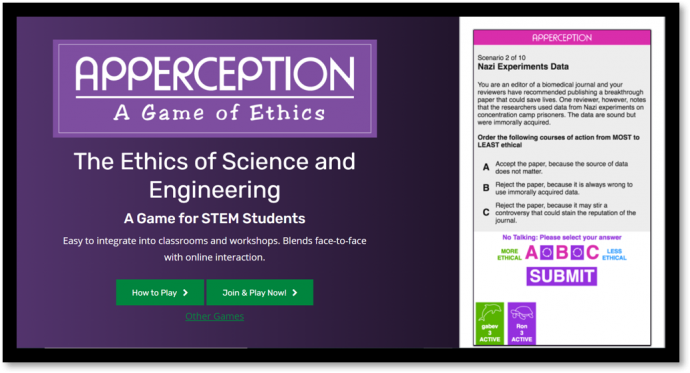Research
CER2’s ethics research covers three main areas:
- developing novel ethics education interventions
- assessing ethics education interventions
- policy for ethical and responsible research
Novel Interventions – Ethics Games
Both CER2 Director Holbrook and Core Faculty Richard Cimino have worked on independent projects to develop games for STEM ethics education.
Apperception
Apperception is a game designed to get STEM students thinking about ethics. The game blends online scenarios with face-to-face discussion. It is played by groups of 4 or 5 students – larger classes can be broken into these smaller groups, which can each play the game simultaneously in the same room. Game players just need an internet-enabled device (phone, laptop, or tablet). Apperception is intended as a flexible supplement to be integrated into existing classroom and workshop curricula – teachers can use it once for a short time just to spark discussion, they can use it for longer games multiple times, or anything in-between.
Apperception poses students with challenging and ambiguous ethical scenarios related to research, teaching, mentorship, and professional life both within and beyond the university. It asks them to rank three possible responses to the scenario from most to least ethical. Then, players engage in a discussion where they need to both make the case for their rankings and listen to and assess the arguments made by other players.
The goals of apperception are to ignite thinking and dialogue, expose players to the viewpoints of others, and develop their ethical decision-making abilities. The hope is that this fun and engaging approach to STEM ethics education offers a valuable resource for students, teachers, researchers, and mentors.

Novel Interventions – Social Justice
A grant from the National Science Foundation’s IUSE program supports a collaborative research project between NJIT and the University of Florida. “Collaborative Research: Engineering Ethics Education for Social Justice” will allow NJIT PI Holbrook and UF PI Elliot Douglas to redesign their engineering ethics classes around the idea of social justice and test the effectiveness of that approach compared to traditional approaches.
Assessing Ethics Education
A grant from the National Science Foundation’s ER2 program supports “Collaborative Research: Project Incubation – NJIT-CAREs: New Jersey Institute of Technology Campus Alignment Review of Ethics.” NJIT-CAREs will be a one-year project starting in November 2021. Researchers from Harvard University, Stanford University, and the University of South Florida who are members of a research consortium, the National Ethics Project (NEP), join forces with investigators from NJIT to build an evidence-based account of an institution’s commitment to ethics education. Employing mixed-methodologies, we will test tools and techniques that combine novel and traditional methods from the digital humanities, psychology, and design thinking. These tools were designed by the NEP to benefit a broad range of institutions of higher education in auditing and transforming approaches to Ethical and Responsible Research. For this project, we will focus on alignment: identifying consistency with institution, faculty, and student statements and perceptions that include instructor goals, activities, and assessment techniques, student perception, and stated institutional commitment to ethics.
A grant from the Public Interest Technology University Network (PIT-UN) supports an ongoing collaboration between NJIT’s CER2, the Edmund J. Safra Center for Ethics at Harvard University, the McCoy Family Center for Ethics in Society at Stanford University, and the National Ethics Project. The PIT-UN Challenge Grant “Evaluating and Assessing Tech Ethics Education” compares different approaches to tech ethics education at NJIT, Harvard, and Stanford.
A grant from the National Science Foundation’s CCE-STEM program supported a “Workshop on Assessing Ethics Education Interventions in Science and Engineering” that took place on August 8 and 9, 2019.
Policy for Ethical and Responsible Research
A grant from the National Science Foundation’s CBET program will support a “Workshop to Develop a Framework for Community-Engaged Environmental Engineering Research” to be held September 23-24, 2021 in Washington, DC.
